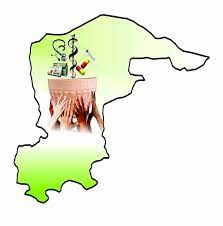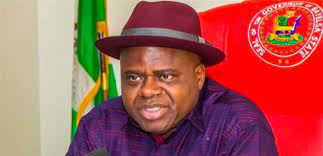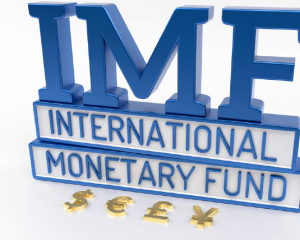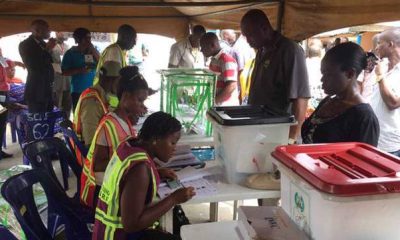Economy
Unveiling Nigeria’s Gold Potentials Through Artisanal, Small Scale Mining

From 2016 to 2020, Nigeria recorded approximately 1.6 million grams. It gold reserve has been estimated to be over 1 million ounces in Osun where detailed exploration and reserve estimation has been done.
Gold in Nigeria was dated back to 1913.
Major gold occurrences are found at various locations in the schist belt of the country; Zamfara, Kebbi, Kaduna, Niger, Osun, Kogi, Oyo, Cross River and Kwara states.Gold mining in Nigeria is predominantly carried out by licenced small-scale miners and informal artisanal miners.
Due to the informal component of gold mining activities, the exploitation of the resources in the country was associated with a lot of illicit activities that gave rise to insecurity.
Other challenges associated with gold mining include loss of revenue due to the government, smuggling of gold products, environmental degradation as well as lack of transparency/ accountability in the gold value and supply chain.
To address all these challenges and for Nigeria to compete with other mining countries globally, Artisanal and Small Scale Mining Department (ASM) was created by the Ministry of Mines and Steel Development (MMSD).
The Presidential Artisanal Gold Mining Initiative (PAGMI) was also initiated with the primary objective to facilitate the formalisation of artisanal and small scale gold miners in Nigeria.
PAGMI was also initiated to facilitate establishment of registered and recognised mineral buying centres to take off the gold produced by ASM, aggregate and refine it to London Bullion Market Association (LBMA) standard while CBN serves as the off taker.
MMSD had also issued two gold refining licences to Kian Smith Limited and Dokia gold and precious metal company to establish, operate and produce gold that meets LBMA standard.
Federal government has also planned to construct gold smelting plant in Kogi for the North Central Zone and a gold souk in Kano from the North West zone.
Similarly, the National Gold Policy, when developed, would serve as an instrument and means by which Nigeria could secure maximum benefits from its gold mining value chains.
The Federal Government in collaboration with the United Nations Industrial Development Organisation (UNIDO)recently unveiled a policy document on gold mining in Nigeria.
This document policy was part of measures to grow revenue, address health challenges associated with gold mining and to attract investors to the mining industry.
UNIDO, some Federal Ministries such as Environment, Health and MMSD jointly unveiled the National Action Plan (NAP) for the Reduction and Eventual Elimination of Mercury Use in the Artisanal and Small-Scale Gold Mining sector in Nigeria.
Mr Jean Bakole, Regional Director and UNIDO Representative to ECOWAS, UNIDO Regional Hub Nigeria, said the policy document was an obligation for Nigeria, as a party under the Minamata Convention and would help drive investments in the mining sector.
He said this plan would provide Nigeria with current data and up-to-date situation analysis of its gold mining which would ultimately appeal to both local and foreign investors.
“More importantly, it has mapped out a way forward for gold mining and its associated mercury management in Nigeria,” he said.
Bakole said the NAP has developed national strategy on gold mining in Nigeria and its associated mercury use by facilitating formalisation and access to finance, among others.
Dr Ochechukwu Ogah, Minister of State, MMSD says Nigeria is blessed with abundant gold enough to address the effect of devaluation of our currency.
Ogah said that Nigeria could use the gold produced to boost its foreign reserve as well.
He said no doubt the gold resources of Nigeria could contribute immensely to the economic diversification of the country but more contributions and efforts from stakeholders were expected.
“We encourage the realisation of the already licenced refineries and welcome more applications from propective investors that want to set up gold refineries in Nigeria.”
He noted that revenue losses due to gold smuggling is humongous because over 95 per cent of local gold sources are from artisanal and small scale operators with difficulties in tracking their operations.
He said that local refining of gold and the proposed export guidelines may help to arrest the challenge.
The Federal government is also making effort to sign MoU with Dubai officials to track smugglers that are diverting Nigeria’s gold worth billions of Naira to Dubai gold souk.
The Minister said that the Federal government was working assiduously to resolve the issues of stigma of fraud, scam and smuggling against the Nigerian native gold sources by the LBMA to optimise earnings from the mineral commodity.
He added that native gold producers that produce in granules or bar form were not registered and the procedure for measuring gold content in all native forms have created uncertainties in the integrity of the local gold market.
Ogah said that Nigeria has put in place policy, legal/regulatory and institutional framework and attractive incentives for the development of its gold and other mineral resources.
The incentive put in place by MMSD for mining investors include exemption from customs and import duties for plant, machinery and equipment for mining operations and three to five years tax holiday as applicable; and tax concessions.
Others are Extension of infrastructure such as roads and electricity to mining sites as well as expatriate quota and resident permits in respect of expatriate personnel engaged by mining companies.
***If used please credit the writer and the News Agency of Nigeria (NAN).
Economy
SEC Advocates Advanced Financial Inclusion by 2030

By Tony Obiechina, Abuja
The Securities and Exchange Commission (SEC) has stressed the need for Nigeria to harness its demographic dividend to advance financial inclusion through investments by 2030 for national survival or face deepening inequality.
The Director-General of the SEC, Dr Emomotimi Agama said this at the United Capital Asset Management Investment forum on Wednesday in Lagos.
Agama, in his keynote address titled: “Advancing Financial Inclusion through Investments: Bridging
Nigeria’s Knowledge and Wealth Gap,” said Nigeria must harness its demographic dividend to boost investment.
“Our theme, Advancing Financial Inclusion through Investments, is not aspirational; it is foundational to national survival.
“We stand at a pivotal moment. By 2030, Nigeria can either harness its demographic dividend or face deepening inequality. The knowledge-wealth gap is not merely an economic challenge; it is a moral imperative,” Agama said.
He said the term inclusion should be reframed as active financial involvement, where access meets empowerment, and capital becomes a tool for transformation.
Agama said that closing the financial inclusion gender gap could lift 700,000 Nigerians from poverty.
He said, “Nigeria has a great population yet we have a tiny drop of this number of persons involved in the capital market.
“That one reason for poverty, because we are running from money. We have to do something. Our market capitalisation is an opportunity to do something,
We all have
“We need to change the narrative and move the market forward. We must reach out to make the difference. We are committed to protecting investors and developing the market. Our goal is to do the right thing no matter whose ox is gored. We will work by the principles of fairness and equity to change the market. We will provide a fair ground for everyone to aspire.
He noted that MTN Nigeria’s share offering drew 150,000 new investors – 75 per cent women, 85 per cent under 40.
Agama recommended a four-pillar strategy for bridging the gaps.
He listed the four-pillar strategy as democratisation of financial knowledge, catalyse MSME Investment Channels, blended Finance Vehicles: Partner with Bank of Industry (BOI) to de-risk loans for women-led SMEs.
“We need to educate people about finances. As we drive this market, we do so for a purpose, I enjoin everyone to be the disciple and the apostles. Getting this market to move is a deliberate action,” he added.
| ReplyReply allForwardAdd reaction |
Economy
NPA Assures of Over N1.27trn Revenue in 2025

By Ubong Ukpong, Abuja
The Nigerian Ports Authority (NPA) on Monday assured that it would take into the coffers massive revenue of over N1.27 trillion in 2025, representing a 40 percent increase from the N894.86 billion it realized in 2024.
This ambitious target, the Authority said, was anchored on sweeping modernization efforts, the full activation of the Dangote Refinery’s marine operations, and the deployment of cutting-edge technology to enhance port efficiency.
Managing Director of the NPA, Abubakar Dantsoho, disclosed this in a presentation during his agency’s budget defence session wih the House of Representatives Committee on Ports and Harbours, where he defended the agency’s 2025 budget estimates and provided insights into its 2024 performance.
“Our 2025 budget proposal is more than figures, it reflects our aspirations for a more efficient, globally competitive port system,” Dantsoho told lawmakers, adding that over 70% of the proposed expenditure will go into capital projects.
For 2024, the Authority surpassed its revenue target of N865.39 billion, posting an actual realization of N894.86 billion.
However, Dantsoho revealed that only N417.86 billion, less than half of the approved N850.92 billion expenditure, had been spent as of the time of reporting.
Despite this, NPA made a record contribution of N400.8 billion to the Consolidated Revenue Fund (CRF) in 2024, nearly double the N213.23 billion remitted in 2023. Of this amount, a staggering N344.7 billion was deducted at source.
“This shows our unwavering commitment to national revenue generation, even when our own operational liquidity is affected,” the NPA boss stressed.
Dantsoho said the projected revenue increase is premised on several key assumptions and developments, including: The full operation of the Dangote Refinery, which alone is expected to draw in over 600 vessels annually through its Single Point Mooring (SPM) system; the commissioning of upgraded terminals at WACT and OMT, which will enhance container traffic; the implementation of automation tools such as the National Single Window, Port Community System (PCS), and Vessel Traffic Management System (VTMS); and increased cargo volumes stemming from global disruptions, including the Russia-Ukraine conflict, which has affected global trade routes.
He said the 2025 revenue is expected to come from the following key sources: Ship Dues, N544.06 billion; Cargo Dues, N413.06 billion; Concession Fees, N249.69 billion; and Administrative Revenue, N73.07 billion
Of the proposed N1.14 trillion total expenditure for 2025, N778.46 billion is earmarked for capital projects.
This investment, he said, will target the revitalization of critical infrastructure, including the Calabar, Warri, and Burutu ports and channels, and enhance towage services, channel depth, and compliance with international security conventions.
“Investments in infrastructure and technology are non-negotiable if we are to stay competitive regionally and globally,” Dantsoho emphasized.
He cited increasing competition from neighboring ports and aging assets across Nigeria’s coastal corridors.
The NPA also intends to address technology gaps by upgrading legacy systems and bolstering cybersecurity, ensuring Nigerian ports meet global standards for digital operations.
“We can say that with timely access to internally generated revenue and capital funds NPA would deliver the kind of impact Nigeria expects,” he said.
Chairman of the Committee, Hon. Nnolim Nnaji, urged the NPA to ramp up performance, improve port infrastructure, and play a greater role in addressing Nigeria’s revenue and unemployment challenges.
Nnaji said the ports remain a critical pillar of Nigeria’s economy, and urged the agency to meet rising expectations despite operational challenges.
“No country can thrive economically without high-performing ports. They are the economic heartbeat of every nation, determining how buoyant a country is through the flow of imports and exports,” Hon Nnaji said.
The committee praised NPA for its performance.
Nnaji stressed that the NPA’s performance has implications beyond maritime activity, noting that increased port output can significantly boost job creation across several sectors.
“The Nigerian Ports Authority is not just a revenue-generating agency, it is a national asset in terms of employment and economic impact.
“We expect to see detailed strategies on how to improve revenue generation and expand employment opportunities through your 2025 budget,” he said.
The lawmaker also pointed to growing interest in the development of new ports across the country but cautioned against neglecting existing port infrastructure.
“As we welcome investment in new ports, we must not abandon the old ones. Maintaining and upgrading our existing ports, both in the Eastern Corridor and the Western axis, is essential to long-term sustainability,” he added.
The Committee called for a clear outline from the NPA on how its 2025 financial plan will address pressing national concerns and reaffirm Nigeria’s competitiveness in regional and global maritime trade.
Economy
Senate Sets N10trn Revenue Target for NCS, Urges Agency to Curb Smuggling, Illicit Drugs

By Eze Okechukwu, Abuja
The Senate, through its Committee on Customs has set a revenue target of N10 trillion for the Nigeria Customs Service for the 2025 fiscal year, instead of the initial N6.584 trillion given to her earlier on while urging the agency to clamp down on smuggling and Illicit drugs.
The Chairman of the Committee, Senator Isah Jibrin (Kogi East), who gave the agency the marching order yesterday in Abuja during the budget defence of the revenue driving agency however commended her for exceeding its 2024 revenue target of N5.
079 trillion.The NCS team led by Deputy Comptroller General, Jibo Bello who represented the Comptroller General presented the 2024 budget performance with a revenue target of N5.
079 trillion, stressing that the proposal was exceeded by over a trillion naira.The Committee, obviously impressed by the performance commended NCS before asking them to go ahead and present the 2025 budget proposal, which the agency tied at N6.584 trillion revenue target with an expenditure of N1.132 trillion.
Following their presentation, members of the Senate Committee on Customs unanimously approved the recommendation of the revenue target of N6.584 trillion and the expenditure of N1.132 trillion for the 2025 financial year.
The Committee will subsequently present the budget proposal to the Senate at plenary most likely this week as the red chamber resumes today after a long recess tied to Eid celebration.
In his final remarks, Senator Jibrin emphasised the need for the NCS to rise up in terms of its surveillance with respect to illicit drugs and smuggling “to ensure that, as much as possible, you should be on top of your game”.
He said there are so many illicit drugs flowing all over the place, which according to him “is contributing to the issue of banditry in Nigeria because most of these guys are on drugs. What I’m saying is that, in addition to your revenue drives, you should also be mindful of some of these other functions.






























